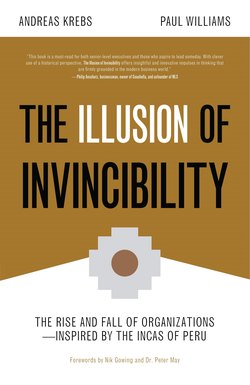Читать книгу The Illusion of Invincibility - Paul Williams - Страница 5
На сайте Литреса книга снята с продажи.
ОглавлениеForeword by Nik Gowing
Founder and director of “Thinking the Unthinkable” and main presenter, BBC World News 1996–2014.
Business and leadership have always faced immense vulnerabilities. Enterprises begin with great energy and innovative ideas that develop through the start-up period and seed funding. Commitment and determination are vital to ensuring early success. A strong sense of self-belief and invincibility fuels a conviction that failure is not even possible.
Then comes the scaling up, and hopefully the sustaining of success. Failing to be nimble and agile, with a constant anxiety about what is being missed, has always triggered a cost. Often that price can ultimately turn out to be existential, both for brands and professional reputations.
At the start of this third decade of the twenty-first century, those pressures and that reality are sharper than ever. Business and politics are wrestling with the scale of a new disruption. It is getting deeper and wider. The timelines are shorter. Public intolerance and impatience are sharper than ever. Customers and voters alike—especially the NEXTGEN—push back against anything or anyone they don’t like.
We assume the current disruptions and challenges to all are not a blip. The often-brutal realities and lessons of history should warn us to expect this challenge to what almost everyone assumes is an automatic continuation of seventy years of stability and normality since World War II. After all, it is assumed that things and fortune will always—on balance—get better.
In so many ways, we have been fortunate. Yet now, most leaders and those they serve are unable to grip the nature, scale, and implications of disruptions that are underway. Denial and disbelief tend to be the default, not a pragmatic embracing of unthinkables and unpalatables.
The way things have been is not the way they are and will soon be. Destabilisation and subversion of all we assume and have taken for granted are underway. Handling the new disruptions requires new skills and talents. But leaders, who largely qualified for the top by conforming, are neither skilled nor prepared for what needs to be a profound, earth-shaking change in their approach. Conformity that qualified them for the top disqualifies them from providing the leadership needed.
This is why this reality check assembled by Andreas Krebs and Paul Williams is so intriguing.
Their comparison of twenty-first century leadership vulnerabilities with how the Inca empire first grew at an extraordinary rate to dominate South America, then imploded ignominiously, is both sobering and inspiring. As they report, there is always a “logic to decline.” But, inevitably, the leaders involved are blind to that logic. The Incas showed that. They never fully realized what threatened them until far too late.
Like so much in business, politics, and leadership, the impact of what you read here in The Illusion of Invincibility was catalysed by a chance set of circumstances: a corporate invitation to travel to Latin America to conduct a business workshop. The research link would not easily have come sitting in Germany. But a personal intrigue to start lifting a private veil on the realities—both remarkable and shocking—of the Inca hegemony suddenly created a wholly different range of perceptions about the travails of being a leader today.
These ever deeper insights from an altitude of up to 3,500 meters in the Andes energize all that is reported and analysed in this book.
For example, Nokia should have learned much from the Incas. The company’s breath-taking journey from forestry and manufacturing rubber boots in Finland to being a world leader in mobile phones, then its crash into ignominy with little value in a corporate fire sale, matched the rise and fall of the Incas. Authoritarian leadership, overambition, conceit, and hubris marked the record of both. Even Jeff Bezos of Amazon concedes that, one day, the mega global e-retailer he created “will fail.” Probably because of blindness on that part of leadership to the fragilities created by success and inflated self-belief within one of the world’s largest corporations.
The overarching message from the Incas for leaders is that there must be a “stress test for your egos.” So review urgently our approach to HR. Review also who you seek to work with and who you seek to work for you. And think early enough about who and what comes next, after you have left the company.
It takes cunning and intellectual gymnastics to draw cogent lessons for present day leaders from the brutality, unbridled self-confidence, and “uncontrolled egos” of a South American empire at the height of its dominance five hundred years ago. But the analogies are sobering. It works.
So take note. And consider the relevance to how you lead.
Nik Gowing, London, UK
